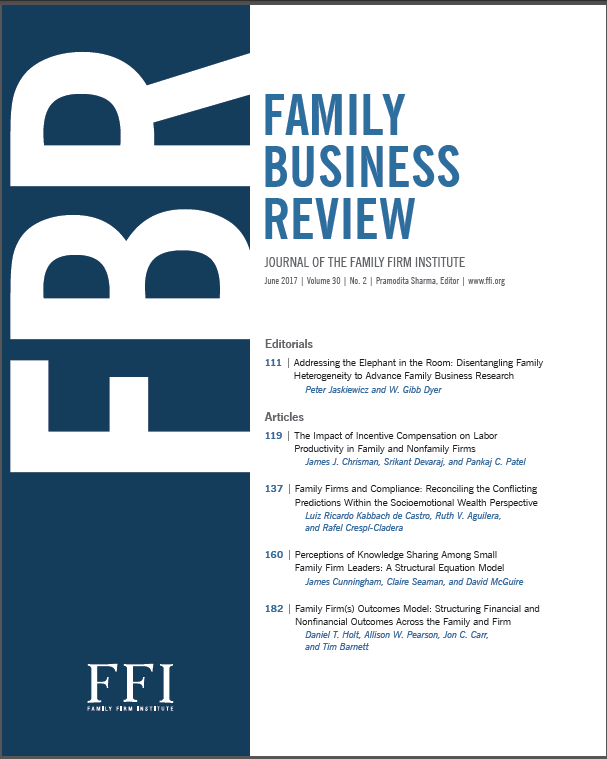家庭的中心性
IF 5.6
1区 管理学
Q1 BUSINESS
引用次数: 7
摘要
2020年3月,《家族企业评论》(FBR)的开篇社论承认了家庭在我们生活中的重要性,并强调了在我们与他人的所有关系中,无论是个人关系还是职业关系,家庭关系都是最相关和最核心的(Payne,2020)。家庭心理学文献指出,家庭中父母支柱的象征性和隐喻性表征深深影响了我们对周围世界的看法(Tognazzo&Neubaum,2020)。自该问题发布以来,整个世界(以及我们的生活方式)都被疫情打乱了,带来了许多不可预见的挑战和变化,这些挑战和变化没有让我们的关系或社会的一部分受到干扰。不可否认,我们与他人互动的方式已经发生了改变。在过去一年出现的许多试验中,最困难的可以说是那些涉及家庭和工作之间不可分割的平衡的试验。在我们的许多角色中——作为父母、子女、配偶、伴侣、经理、教师、员工、企业主和看护人等等——一直存在着持续监测和评估情况的需求,以确保我们周围许多人的短期和长期福祉。优先事项和日常生活发生了变化。尽管在“拉平”新冠肺炎感染曲线和帮助社会应对社交距离带来的困难(例如,虚拟会议平台的发展、更广泛的工作场所结构、无接触零售和远程教育)方面取得了巨大进展,但其中许多努力往往提醒我们密切关系的重要性,亲密的家庭关系。由于这些变化提醒我们这种关系的价值,这种关系有时会被视为理所当然,我们也提醒我们家庭关系在公司背景下的力量和影响。鉴于家庭在许多公司中的不可或缺的作用,我们社会的这些变化通过联系和必要性强调了家庭和企业之间的紧密联系和相互依赖。在过去的几个月里,我们学到了一个明确的教训,那就是经济和整个社会的福祉如何同时取决于我们家庭和商业系统的交织福祉。如果没有别的,2020年也许开创了一个与家族企业相关的新时代,使我们的领域对世界来说更加明显和必要。正是意识到这一点,我们建议家族企业学者满怀信心地向前迈进,认识到我们的工作可以发挥独特而重要的作用;我们可以改变企业和社会如何应对已经出现或即将出现的许多挑战和相关机遇。我们认为,当前的危机可能对家族企业产生特别大的影响,因此,学者们看待家族企业研究基本假设的方式可能需要进行重大反思。正如De Massis和Rondi(2020)所建议的那样,当前的背景无疑提供了无数的研究问题,可以促进我们对家族企业的理解,以及它们如何应对这些不确定的时代。事实上,我们相信,我们的领域可能处于独特的地位,能够理解和应对其中的一些挑战以及随之而来的应对措施。例如,家族企业学者早就认识到一些家族企业具有长寿和恢复力的潜力。像Baroviers这样经营Barovier和Toso的家族,罚款995268 FBRXXX10.1177/0894486521995268《家族企业评论》Neubaum和Payne编辑2021本文章由计算机程序翻译,如有差异,请以英文原文为准。
The Centrality of Family
In March of 2020, the opening editorial in Family Business Review (FBR) acknowledged the importance of family in our lives and highlighted—that how, among all the relationships we have with others, both personal and professional, familial relationships represent the most relevant and central of all (Payne, 2020). The family psychology literature notes that the symbolic and metaphorical representations of the maternal and paternal pillars of the family deeply influence our perceptions of the world around us (Tognazzo & Neubaum, 2020). Since the release of that issue, the entire world (along with our way of life) has been disrupted by the pandemic, ushering in many unforeseen challenges and changes that have left no relationship or part of our society undisturbed. The way we interact with others has been undeniably altered. Among the many trials emerging over the past year, the most difficult are arguably those that involve the inextricable balance between family and work. Of our many roles—as parents, children, spouses, partners, managers, teachers, employees, business owners, and caretakers, and so on—there persists a demand to continually monitor and assess situations to ensure the shortand long-term well-being of the many people around us. Priorities and routines change. Although great strides have been made to “flatten the curve” of COVID-19 infections and help society navigate the hardships stemming from social distancing (e.g., the evolution of virtual meeting platforms, more extensive work-from-home structures, touch-free retailing, and remote schooling), many of these efforts tend to remind us of the importance of close relationships, and especially, close familial relationships. As these changes have reminded us of the value of such relationships, which can occasionally be taken for granted, we are also reminded of the strength and impact of familial relationships in the context of a firm. Given the integral role of the family in many firms, these changes in our society have underscored, by association and necessity, the tight-knit and mutual dependence between families and business. One clear lesson learned these past months is how the well-being of the economy, and society at large, is simultaneously dependent on the interwoven wellbeing of our family and business systems. If nothing else, 2020 has perhaps ushered in a new era of relevance for family businesses, making our field all the more obvious and imperative to the world. It is with this realization that we suggest family business scholars move forward with confidence, recognizing that our work has a unique and important role to play; we can make a difference in how businesses and society respond to the many challenges and associated opportunities that have emerged or will soon emerge. We believe the current crisis may be particularly impactful on family businesses, and as such, the way scholars view the underlying assumption to family business research may require significant rethinking. As suggested by De Massis and Rondi (2020), the current context surely provides a myriad research questions that can advance our understanding of family businesses and how they navigate these uncertain times. In fact, it is our belief that our field may be uniquely positioned to understand, and address, some of these challenges and ensuing responses. For example, family businesses scholars have long recognized the potential for longevity and resilience among some family businesses. Families like the Baroviers, who operate Barovier and Toso, a fine 995268 FBRXXX10.1177/0894486521995268Family Business ReviewNeubaum and Payne editorial2021
求助全文
通过发布文献求助,成功后即可免费获取论文全文。
去求助
来源期刊

Family Business Review
BUSINESS-
CiteScore
12.40
自引率
13.60%
发文量
13
期刊介绍:
Family Business Review (FBR) has been a refereed journal since 1988, serving as the premier scholarly publication dedicated to the study of family-controlled enterprises. It delves into the dynamics of these businesses, encompassing a range of sizes from small to very large. FBR concentrates not only on the entrepreneurial founding generation but also on family enterprises in subsequent generations, including some of the world's oldest companies. The journal also publishes interdisciplinary research covering families of wealth, family foundations, and offices.
 求助内容:
求助内容: 应助结果提醒方式:
应助结果提醒方式:


